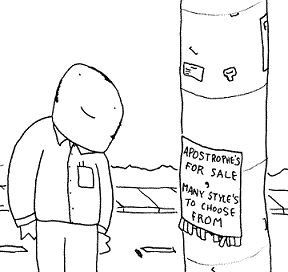Would you like to improve your conversational skills in business and social encounters and never struggle again for something to talk about?
Here’s my tip. Turn on your radio and listen to a local talk-back program, where listeners get to phone in, share their thoughts and vent their spleen at the host and the general public. That will give you all the conversation topics you’ll ever need. That includes a conversational gem that no ‘Top Conversation Starter Guides’ will ever suggest.
It’s language.
We love talking about language. Or rather, we love complaining about language – how everyone else misuses language and how language has degenerated, from ‘weasel words’ to texting slang to sloppy prnunciashn.
For more evidence of just how much we care about our language, jump on the internet and type ‘improve your English’. You’ll find a bewildering and growing array of guides, blogs, tutorials, forums and articles about writing and speaking ‘properly’ at work and socially.
It all seems terribly obsessive and more than a tad late Victorian-era classroom.
For sure, these days we mightn’t endure endless lines-writing, the cane or other delightful forms of corporal punishment for incorrect or inane language (‘Ms Ridgway, write out one hundred times after work ‘I will not use “their” in the third person singular or email people to “touch base”!’). But we still react with aggressively punitive attitudes to language usage that doesn’t fit in with our idea of What’s Right.
The massive publishing industry this has spawned has interesting parallels with the diet and self-help industries, feeding off off not only our desires for self-improvement but also our own insecurities.
So why do we get so worked up about the way we use, misuse and rework language? And what’s the big deal about language changes?
Well, it’s a big deal and we get worked up about it because language is at the heart of who we are as individuals and community. Language is identity.
Language is therefore intensely personal…so we take it personally. Language is right at the core of every single human encounter. And we’re conditioned in the formative years of our lives about the ‘appropriate’ way we should use language in all situations.
I think that our anxieties about language also reflect our anxieties about ambiguity, our inherent need for certainty about our own identities and the different ways in which we manifest those anxieties.
Seeing your own language – the very core of your identity – shift under your feet in a world of constant change is confronting. And language change is all the more disturbing for being impossible to hold back.
Over time, since the invention of the printing press and the rise of literacy, language has not just become increasingly codified but it has come to be used in particular ways as a tool of social inclusion and exclusion. Once, the great and the powerful toyed with different spellings. Today, you’re looked down upon for using apostrophes with plurals (‘Look how the café people wrote “Special’s” on the board. Oh my God! Great almond milk lattes, but’) . Elsewhere, your one spelling mistake could wreck your chances at that coveted position or contract.

Language change is also disruptive. In business, that disruption brings a financial cost, as we keep up with ‘version change’, endlessly correct and micromanage ‘mistakes’, reassess the way we reinterpret things and implement that in our business activities.
In today’s interconnected world with its powerful linguistic change agents at work, like our highly mobilised workforces, language is paradoxically buckled into codification and standards as never before. So we get very concerned about consistency and adherence to widely agreed protocols of language usage, as set out by dictionaries and generations of educators.
It’s just that ‒ strap it down as we would ‒ language keeps right on changing.
My take on it is: the more language is formally codified in our business and social interactions, the more importance we place on using it consistently. And it’s a short step backwards from there to judging each other’s language usage through a moral ‘right and wrong’ prism.
When this part of our core identity is challenged by inevitable change, or by the rise of other languages or language varieties, we feel personally affronted, even if we don’t consciously realise it. And when our conditioning in ‘appropriate’ language usage is challenged when we move into different cultural work and social settings or by the rise of new language influences, that’s disruptive, too ‒ threatening, even. So out come the dictionaries and in come the language vigilantes.

Sooo many language guides!
It’s no wonder that complaints about language are one of talkback radio’s most enduringly consistent themes.
My beloved ‘Austrayan’ is a case in point. It generates much gloomy enthusiasm among our earnest and sinless guardians of the Mother Tongue. Not only is Australian English still seen as a sort of inferior colonial appendage to ‘proper’ British English, but Australian English’s natural evolution as a living language and its wonderful receptivity to change and enrichment ever since Europeans first settled in Terra Australis have been continually badged as being somehow wrong. Our degenerating grammar and punctuation. Our rising intonation? Our informal discourse and skewed semantics. Our shortened words. Our MareCanised lexicon. And our repulsive Strine accent.
In other words, our language has been evolving. That’s what language does, people!
Recently, yet another opinion piece berating Australians for their appalling language usage was solemnly published in a Melbourne daily. The author held it up as proof of Australians’ general moral degeneracy. Alcohol was mentioned (Australians are and have always been p***heads – just look at our hopelessly slurred and sloppy utterances). It would have been fun studying that in my historical linguistics class at uni. Linguistic wowserism. In 2015.
Sweating the small stuff on language change and overlooking the real challenges
But it hasn’t stopped us getting all antsy and ‘vunerable’ about it, frothing at our collective mouth that we’re succumbing to some kind of individual and communal moral failing.

The pedants were revolting…in the meantime, a little thing called ‘social change’ was going on
I find that this kind of breast beating completely misses the point about the very real challenges that language change presents in a fast-moving, highly connected, sophisticated and codified world. Language change brings both subtle and sharp changes in meaning. In the recent Paris UN climate summit, the accidental inclusion of the wrong modal auxiliary verb (‘shall’, instead of ‘should’) almost brought the groundbreaking multination agreement undone. If you’re not alert and if the language codification process doesn’t keep up ‒ from compliance standards and instruction manuals through to group emails and voice-prompts ‒ communication breakdowns happen, on a scale from amusing to fatal.
With massive and increasing global movement of people in business, let’s remember that you and I are born agents of language change and disruption. Our very participation in this global movement of people and business is fostering that change. You and I both are the person with the amusing accent, the odd intonation, the different speller of the same word, the user of the same word for completely different meaning, the disrupter of hierarchy. Seeing it from this perspective, I think, is a disarming thought and a wakeup call to see this change – and to see difference – in a more measured light.
And let’s not forget the unalterable reality that language – or all that you can’t touch it, dig it up or label it ‘animal, vegetable or mineral’ – is a human, living, pulsating, constantly evolving thing. So even while I want to scream at individual’s who add possessive apostrophe’s at the end’s of their plural word’s, I know there’s no point getting worked up. It’s just an example of how punctuation is evolving. We’re not losing punctuation itself.
And there will always be what my linguistic lecturer referred to as the ‘principles of appropriateness’ to help guide us around the unspoken linguistic codes that go with any business or other socio-cultural situation.
But as language evolves, these codes and rules that support us to use language appropriately also need to adjust – and that’s a tough task of never-ending catch-up. What the rule books and our own social conditioning tell us we ‘should’ use language simply cannot keep pace with language’s relentless evolution.
So how to deal with language change in a practical, principled but non-judgmental way?
In my career and work helping professionals with their communications needs, I’ve found it works for me to
- read, listen, pay attention and socialise with people from different social and business circles. My ‘way’ is not the only way. I practise learning, by doing, how to adapt to different communication contexts and apply that to the way I communicate (or the way people communicate with me) in different settings, business and social.
- install and consistently use simple, practical version control systems that help me track and manage language change
- take an essentially traditionalist but not rigid approach to my own language usage
- apply a ‘get-real and get on with it’ attitude about the reality of language change in my work
- learn about, practise and adapt to the language variety and communication protocols of the market and organsiation I’m working with
- read through work out loud, recheck, ask for advice and feedback on protocol, style and content, revise and revise again, and
- get a cup of tea and go out into the sunshine for a moment if the steam starts going out through my ears.
So, what’s your recipe for keeping up with language change, in both familiar and less predictable environments?
Anna Ridgway, Director at InterMondo, helps people and organisations overcome communication setbacks and barriers to make a difference in their business success in global business settings. You can contact Anna (or even touch base) at anna@intermondo.com.au to find out more.


